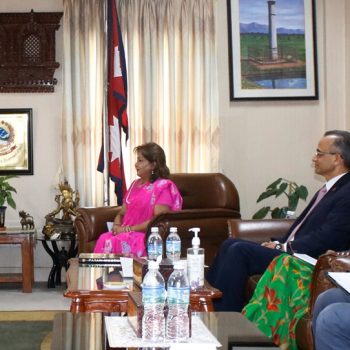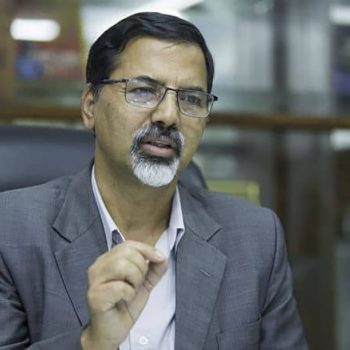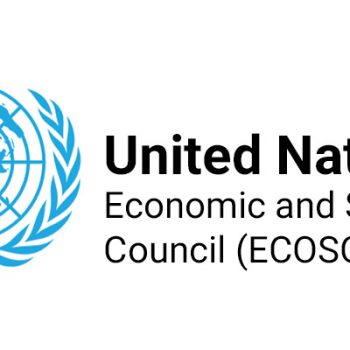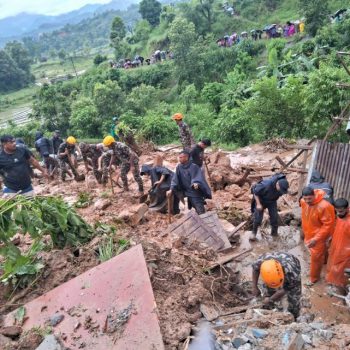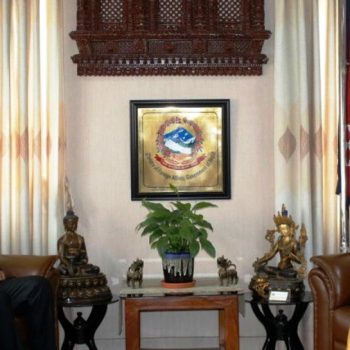Advancing Nepal’s global position: The imperative for world class universities

Nepal’s odyssey to excellence in higher education
Nepal, a land nestled between the soaring peaks of the Himalayas and the plains of the Terai, is a nation that has enchanted the world with its kaleidoscope of cultures, breathtaking landscapes, and indomitable spirit.
As history unfolds on its rugged terrain, Nepal’s rich cultural heritage and natural beauty have been constant beacons, drawing travelers, scholars, and adventurers alike. Yet, beyond its picturesque landscapes, Nepal faces a pressing challenge – the need to foster its own intellectual landscape and secure a place of prominence on the global stage.
A tapestry of resilience and diversity
Nepal’s story is etched with tales of resilience and a vibrant mosaic of diversity. From the ancient cities of Kathmandu Valley that hold the secrets of centuries past, to the tranquil monasteries that echo with spiritual wisdom, Nepal’s cultural heritage transcends time.
The majestic Himalayas, clothed in mystic beauty, guard the nation’s northern frontier, while the southern plains hum with bustling energy and fertile lands. Yet, while Nepal’s natural and cultural treasures are a source of pride, they merely hint at the nation’s untapped potential.
Aiming for Progress on a Global Stage
In an era where the world hurtles forward with technological breakthroughs, medical advancements, and scientific discoveries, Nepal stands at a crossroads. The aspirations of its people, resonant with the echoes of progress, beckon the nation to step onto the path of development.
As the world witnesses unprecedented transformations in diverse fields, Nepal’s vision extends beyond its borders, seeking to make its mark in this unfolding narrative of progress.
The crucial imperative: World-class universities
In this journey toward development, Nepal identifies a crucial piece of the puzzle: world-class universities. These institutions are not mere edifices of learning; they are bridges to innovation, gateways to opportunity, and conduits of transformation.
They serve as lighthouses guiding the nation toward intellectual excellence and global recognition. World-class universities hold the potential to ignite a renaissance of thought, nurturing the minds that will pioneer breakthroughs, drive economic growth, and solidify Nepal’s standing on the international stage.
Academic landscape: A reality check
Nepal’s earnest commitment to education is undeniable, yet the nation’s academic landscape stands at a crossroads, facing challenges that have profound implications for its international competitiveness and sustainable growth.
While Nepal has made commendable strides in primary and secondary education, the absence of globally renowned universities poses a significant hurdle to its progress in higher education and advanced research. This stark reality has led to the emergence of a concerning trend – the brain drain phenomenon.
The absence of globally renowned universities
At the heart of Nepal’s academic landscape lies a critical void: the absence of universities that can command global recognition for their research, innovation, and educational excellence.
While there are institutions that offer education in various disciplines, the absence of top-tier universities inhibits the nation’s capacity to attract and retain the brightest minds within its borders.
As a result, many ambitious students and talented researchers seek educational and career opportunities abroad, drawn to the allure of institutions that have earned their place on the world stage.
The brain drain phenomenon
The brain drain phenomenon, a byproduct of Nepal’s lack of advanced educational institutions, is a pressing concern that transcends individual stories and has far-reaching consequences for the nation’s development trajectory.
Talented individuals, armed with aspirations for personal and professional growth, venture abroad to seek education and employment opportunities that align with their ambitions. While this diaspora of talent speaks to the resourcefulness of Nepalese individuals, it also signifies a depletion of the country’s most valuable asset: human resources.
Quantifying the brain drain
To put the scale of the brain drain into perspective, recent estimates paint a sobering picture.
Over the past decade, Nepal has witnessed an exodus of approximately 10,000 skilled professionals each year, as they seek greener pastures in foreign lands. This annual loss of human capital is not merely a numerical statistic; it represents a vast pool of intellectual potential that Nepal invests in nurturing but inadvertently exports due to the lack of advanced educational opportunities at home.
Lost Potential: Innovation and economic growth
Beyond the immediate loss of talent lies a deeper concern: the missed opportunities for innovation and economic growth. The skilled professionals who leave Nepal possess the capacity to drive transformative change, both within the nation’s borders and on a global scale.
When these individuals are compelled to seek education and employment abroad, it results in a stagnation of domestic innovation, a lack of cutting-edge research, and a diminished capacity for economic diversification.
Driving innovation and research: Unleashing Nepal’s intellectual potential
World-class universities serve as dynamic hubs of innovation and research, igniting the spark of discovery that propels societies forward. These institutions provide an ecosystem that nurtures curiosity, fosters interdisciplinary collaboration, and empowers researchers and students to push the boundaries of knowledge. By establishing such centers of excellence within Nepal’s borders, the nation has a remarkable opportunity to harness its own resources and local expertise to drive research endeavors that not only benefit the nation but also contribute to global advancements.
A nexus of breakthroughs
At the heart of world-class universities lies a culture of intellectual curiosity and exploration. The convergence of bright minds from diverse backgrounds, along with state-of-the-art facilities, fuels the generation of cutting-edge discoveries. This synergy doesn’t merely lead to incremental progress; it has the potential to yield breakthroughs that transform industries, address pressing global challenges, and pioneer innovative solutions.
Nepal’s unique contributions
Nepal possesses a wealth of unique resources, be it its rich biodiversity, distinct cultural heritage, or geographical peculiarities. World-class universities would serve as platforms to channel these resources into research that has both local and global significance.
For instance, interdisciplinary teams could collaborate on projects related to sustainable agriculture, disaster management, renewable energy solutions, and cultural preservation, positioning Nepal as a pioneer in solving challenges that resonate worldwide.
Measuring economic impact: A multiplier effect
The establishment of world-class universities is not just an investment in education; it’s an investment in economic growth and sustainable development. Studies from around the world consistently demonstrate the profound economic impact of higher education institutions.
For every dollar invested in higher education, the return on investment can be as high as threefold over a person’s lifetime. When extrapolated to Nepal, this principle suggests that by fostering a generation of highly skilled professionals through these universities, the nation stands to experience a ripple effect of economic growth.
Catalyzing foreign direct investment
World-class universities have a magnetic effect on global talent and investment. As Nepal establishes these institutions, it becomes a destination for students and researchers from across the globe.
This influx of international talent fosters cultural exchange, builds networks, and attracts foreign direct investment. Industries seeking cutting-edge research and skilled graduates will be drawn to Nepal, resulting in job creation, technology transfer, and a strengthened economic ecosystem.
Empowering the Workforce: Bridging Skills Gap
One of the direct benefits of world-class universities is the creation of a skilled workforce aligned with industry demands. Nepal’s current challenge lies in sending students abroad for specialized education, incurring substantial costs and draining valuable resources.
By having these institutions domestically, Nepal can offer tailored programs that equip students with the skills required by emerging industries. This not only saves resources but also ensures that graduates are immediately valuable to the local job market.
A local solution to global demands
In a rapidly changing global economy, industries are evolving, and skill requirements are shifting. World-class universities in Nepal can be agile in adapting their curricula to match these changes, thus reducing the time lag between skill acquisition and market demand.
As the nation’s workforce evolves to meet contemporary needs, it positions itself as a hub for innovation and expertise, attracting foreign businesses and enhancing its export potential.
Quantifying cost savings: Unleashing domestic potential
Over the span of years, Nepalese families have collectively expended substantial financial resources on sending their students overseas for higher education. This significant outflow of funds not only impacts individual families but also drains the nation’s economic reservoir.
However, the establishment of top-tier universities within Nepal has the potential to turn this financial tide, generating cost savings that can be channeled into domestic investments, thereby catalyzing a palpable boost to the national economy.
Counting the monetary toll
The monetary investment made by Nepalese families in foreign education is undeniably remarkable, often running into millions. These substantial financial commitments encompass tuition fees, living expenses, travel costs, and more.
The cumulative effect of these expenditures is felt not only by individual households but also by the broader economy, where significant financial resources are diverted from potential domestic investments.
Significant Cost Reductions
The establishment of world-class universities on home soil presents an opportunity for substantial cost reductions. With access to comparable quality education within Nepal’s borders, families can avoid the high expenses associated with overseas education.
Reduced tuition fees, elimination of travel and living costs abroad, and the convenience of proximity can contribute to sizeable financial savings for families across the nation.
Resource rechanneling and economic boost
The redirection of funds previously allocated for foreign education holds the potential to initiate a ripple effect throughout the Nepalese economy. Freed financial resources can be reinvested in diverse sectors, from entrepreneurial ventures and small businesses to real estate and local infrastructure projects. This injection of capital can invigorate economic growth, foster job creation, and stimulate various economic activities, ultimately bolstering Nepal’s economic foundation.
Enhancing global standing: Elevating Nepal’s reputation
A nation’s global standing rests intrinsically upon the strength of its intellectual and academic contributions. The presence of world-class universities on Nepalese soil has far-reaching implications for the nation’s reputation and influence on the global stage. These institutions act as beacons of excellence, attracting international attention and fostering collaborations that enrich both domestic and international academia.
Attracting international recognition
World-class universities have an innate ability to captivate global attention. As centers of innovation, research, and intellectual dialogue, they draw researchers, scholars, and students from around the world. By hosting such institutions, Nepal positions itself as a destination for academic excellence, thereby enhancing its visibility on the international academic map.
Global Collaborations and Knowledge Exchange
The establishment of world-class universities catalyzes partnerships and collaborations with global academic and research institutions. These collaborations transcend geographical boundaries, facilitating the exchange of knowledge, ideas, and expertise.
The resulting cross-pollination of insights enriches Nepal’s intellectual capital and strengthens its ability to contribute to global discourse on critical issues.
Quantifying global collaborations: Measuring soft power
The influence of world-class universities on a nation’s global standing is not solely anecdotal; it’s quantifiable. Countries that boast prominent universities consistently rank higher on global education indices. There is a significant correlation between the presence of renowned universities and a nation’s likelihood to engage in international research collaborations.
Conclusion: Charting Nepal’s path to prosperity
The vision of establishing world-class universities in Nepal transcends the realm of aspiration, emerging as an unequivocal strategic necessity that can redefine the nation’s trajectory toward progress. The quantifiable benefits that await Nepal are not just figures on a balance sheet but crucial pillars that support the edifice of a prosperous, innovative, and globally influential nation.
Realizing the imperative
The urgency of this endeavor becomes vividly clear as we quantify the potential gains. The reduction of brain drain, retention of local talent, and creation of a nurturing ecosystem for innovation and research are not theoretical notions but tangible outcomes that can recalibrate Nepal’s developmental landscape.
A multifaceted approach
Nepal’s journey toward establishing world-class universities demands a multifaceted approach. Collaborating with global partners, leveraging local expertise, and adopting best practices from established institutions are vital components of this pursuit. By fostering international collaborations, Nepal can tap into a global network of knowledge, propelling itself to the forefront of academic and technological advancements.
Transforming Nepal’s economic landscape
The quantifiable economic impact of these universities cannot be underestimated. Reduced brain drain and the subsequent influx of skilled professionals back into the nation can spur economic growth, entrepreneurship, and diversification. The potential return on investment in higher education is not just financial but extends to a vibrant ecosystem of innovation,research, and workforce empowerment.
Elevating Nepal’s global standing
The power of education in shaping a nation’s global standing is profound. World-class universities have the capacity to project Nepal onto the international stage, attracting attention, fostering collaborations, and disseminating knowledge that transcends borders.
Through these institutions, Nepal can influence global narratives, contribute to solutions for shared challenges, and gain recognition for its intellectual contributions.
The path ahead
As Nepal embarks on the transformative journey of establishing world-class universities, it must navigate challenges and seize opportunities with foresight and determination. This endeavor demands a synergy of efforts from policymakers, educators, researchers, and the broader community. By tapping into the latent potential within its borders and embracing a commitment to education, Nepal can reshape its destiny as a beacon of knowledge, innovation, and progress.
Unlocking Nepal’s true potential
In the midst of the Himalayan peaks that have long symbolized Nepal’s resilience and majesty, a new summit awaits – one that represents intellectual prowess, innovation, and global impact. By quantifying the benefits and understanding the strategic significance, the nation stands poised to ascend this peak, carrying with it the aspirations and dreams of generations. The establishment of world-class universities is not just a chapter in Nepal’s story; it is the very essence of its narrative as it forges ahead in a rapidly evolving world.
The author is the Founder & CEO of Vijayee Bhava:, a pioneering startup dedicated to Higher Education Strategic Consulting named HarmonyPath, which draws its inspiration from Eastern Philosophy, forging an innovative approach to guiding educational institutions toward their strategic goals.








